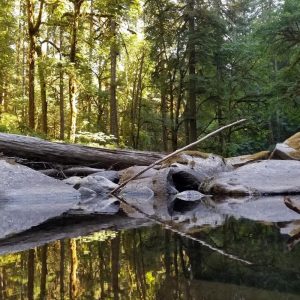
Summer Break: A Reflection on Moving from Theory to Practice
Ultimately, for philosophy to be transformative, I must transcend theoretical understanding and put it into practice. The lessons I have learned at DRBU should be applicable outside of the classroom, but it takes a great deal of reflection to transition from theory to practice. DRBU has provided me an environment to learn and grow with others in a like-minded community. My days have been structured around the study and discussion of texts I find personally fulfilling. But it’s time to put into practice what I’ve learned, now that summer break has arrived and my first year as a student has concluded. For the time being, the structure that DRBU provided to me is gone, and I have to develop my own way of living during this summer of reflection.
In my Rhetoric and Writing II class, we studied an excerpt from The Present Alone Is Our Happiness by Pierre Hadot. He states that ancient philosophy was never meant to remain theoretical, and it “is a spiritual exercise because it is a mode of life, a form of life, a choice of life” (94). Spiritual exercises are defined by Hadot as “voluntary, personal practices meant to bring about a transformation of the individual, a transformation of the self” (87). How then, should the philosophy and lessons I learned at DRBU be used to transform myself? One such method is to understand philosophical discourse in terms of its three parts as lived exercises; the practice of logic, of ethics, and of physics (Hadot 94). Physics, in particular, can be thought of as lived physics: “This lived physics consists, first of all, in seeing things such as they are–not from an anthropological and egotistical point of view, but from the perspective of the cosmos and nature” (Hadot 94). This perspective allows us to see things the way they are, as a part of nature and the universe, instead of making a personal evaluation with our “egotistical point of view.” Hadot goes on to elaborate that “This lived physics also consists in becoming aware of the fact that we are a part of the Whole and must accept the necessary unfolding of this whole with which we identify, because we are one of its parts” (95).
During my transition from school to summer break, it may prove useful to bring myself back to the Whole to keep things in perspective. My theoretical understanding of philosophy becomes real when given the shape of a spiritual exercise. The practice of lived physics, for example, is relevant in assuaging the fears I have projected on to this summer. I fear that I will lose my motivation and will to improve myself because I lack the structure that DRBU provided. I fear that I will revert to feeling empty and lost, and that the lessons I have learned at DRBU will come to nothing in the reality of a new environment. Although these fears are very real and deep-seated within me, they are nevertheless evaluations on events that haven’t occurred. These fears are an emotional turmoil of my own making, and they are assumptions that may or may not come to fruition in reality. Lived physics is an acknowledgment of the literal—fears are not reality.
That’s not to say that these fears are invalid, but they have dominated the greater part of my thinking during my transition to summer break. Fear that keeps you from fulfilling what you seek to do—remaining productive and inspired in my case—should be alleviated in order to accomplish your goals. When put into practice in this sense, theoretical philosophy can evolve into a transformative spiritual exercise. But fear of my education’s ambiguous applications is still present with me. It is a fear I’m taking with me this summer, but it is a fear I’m seeking to transform as well.


